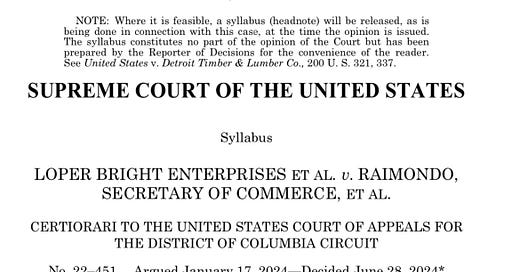Breaking: Supreme Court Overrules Chevron Doctrine
CHEVRON DOCTRINE IS DEAD. FINALLY, SCOTUS RULES: LAW TRUMPS POLICY!
In a landmark decision, the Supreme Court has overruled the Chevron doctrine, significantly altering the landscape of administrative law. This ruling comes from the case of Loper Bright Enterprises et al. v. Raimondo, Secretary of Commerce, et al., with the Court's opinion finalized on June 28, 2024.
The Chevron doctrine, established in the 1984 Chevron U.S.A., Inc. v. Natural Resources Defense Council, Inc. case, mandated that courts defer to federal agency interpretations of ambiguous statutes, provided those interpretations were deemed reasonable. For nearly four decades, this doctrine has been a cornerstone of administrative law, allowing agencies considerable latitude in interpreting and enforcing laws.
The Supreme Court's decision stated, "The Administrative Procedure Act requires courts to exercise their independent judgment in deciding whether an agency has acted within its statutory authority, and courts may not defer to an agency interpretation of the law simply because a statute is ambiguous; Chevron is overruled."
This ruling reasserts the judiciary's role in independently interpreting laws and limits the deference previously granted to federal agencies. The decision emphasizes that the federal judiciary, under Article III of the Constitution, is responsible for adjudicating cases and controversies, including interpreting ambiguous laws without defaulting to agency interpretations.
Supporters of the decision argue that it enhances judicial accountability and reinforces the separation of powers by ensuring that unelected bureaucrats do not hold excessive influence over legal interpretations. Opponents, however, warn that this shift may lead to increased legal uncertainty and potentially hinder the efficient functioning of federal agencies tasked with implementing complex regulatory frameworks.
As the implications of this ruling unfold, it is expected to significantly impact the dynamics of regulatory enforcement and the role of federal agencies in the legal landscape.





Chevron is reversed! This is a time for serious rejoicing! Bureaucrats have no business making rules AT ALL. That job belongs to CONGRESS ALONE. When bureaucrats do it, this violates separation of powers, and also the fact that only ELECTED OFFICIALS should make law. This is a wonderful improvement, but it doesn't go far enough. Give Congress back its job. ALL REGULATIONS should be passed by Congress. Just imagine the liberty that would be restored if this were done. Congressional bills should never be longer than the Constitution itself, and should not contain irrelevant amendments. Any bill which has one bad provision should be voted down. Democrats have been changing our country into one of slavery a little piece at a time through irrelevant provisions and amendments.
"Opponents, however, warn that this shift may... potentially hinder the efficient functioning of federal agencies " LMAO when I read that line.